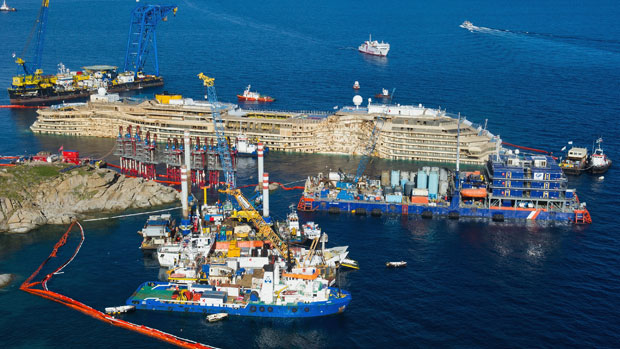Raise the Concordia! PR helps cruise company bury the past
From maritime tragedy to salvage triumph – but on the island of Giglio they have longer memories

A free daily email with the biggest news stories of the day – and the best features from TheWeek.com
You are now subscribed
Your newsletter sign-up was successful
Giglio, Italy - It has taken E1.5 billion to turn the Titanic-sized tragedy of the Costa Concordia cruise ship disaster into a salvage triumph that will go down in maritime history.
Today the Costa Concordia finally leaves Giglio for good as it departs on its last voyage, a five-day, snail's-pace tow to its home port of Genoa where it will eventually be scrapped.
Towed by two tug-boats, and accompanied by a flotilla of rescue and salvage craft, it leaves behind a pristine island, its limpid green waters miraculously unpolluted by the giant floating city that capsized here on 13 January 2012, becoming literally a death chamber after its captain performed an illegal "sail by" of the island.
The Week
Escape your echo chamber. Get the facts behind the news, plus analysis from multiple perspectives.

Sign up for The Week's Free Newsletters
From our morning news briefing to a weekly Good News Newsletter, get the best of The Week delivered directly to your inbox.
From our morning news briefing to a weekly Good News Newsletter, get the best of The Week delivered directly to your inbox.
Thanks to one of the most expensive image transformation campaigns in corporate history, the story today is not about the 4,000-plus desperate passengers catapulted onto Giglio's quayside that cold January night, nor of the 20 long months it took to bring up the bodies of the 32 victims (one, an Indian waiter is still missing).
Instead, the story is all about steel, strandjacks, sponsons and the mega “parbuckling project” that enabled the Costa Concordia to be righted and towed away.
Behind this transformation of the Costa Concordia from crime scene to high-tech salvage triumph was a highly orchestrated PR operation by Carnival Cruise Lines and its subsidiary Costa Cruises. They hired London Offshore Consultants and the crisis management specialists Burson-Marsteller to put a shine on their tarnished image.
On the night of the disaster, some Costa employees refused to give their names to passengers and reporters begging for information. In recent days, polite staffers have emailed multiple updates on the minutiae of the salvage operation while the international media have been given access to work stations, live feeds and high-definition corporate footage in the old elementary school transformed into a temporary press centre.
A free daily email with the biggest news stories of the day – and the best features from TheWeek.com
Not everybody has taken the bait. Anne Decre was one of French passengers aboard the Costa Concordia's final cruise. She now leads a vociferous French victims' association fighting for justice and compensation.
“They have spent E1.5 billion righting this ship, but … you can do anything with money. And it may be high-tech, but it was not technology that saved our lives. It was the wind. The wind that blew us inland where the ship could rest on its side, otherwise we would all be dead. With all the technology available, it was just one man who ran us into the rocks."
That man – Captain Francesco Schettino – is on trial for manslaughter but remains free on bail. Photographers snapped him on the eve of the ship’s departure for Genoa, partying on Ischia, another Mediteranean island south of here. His trial resumes on 22 September, after a nearly two-month summer hiatus.
The image of a suntanned Schettino enjoying his summer of freedom has triggered indignant reactions from victim's families, mostly about the inefficiencies of the plodding Italian justice system.
“It is slow and there is only criminal trial, and no civil trial," said Decre. "There are no translations – only the Germans have them –and the hearings are just two days a week, held in an old theatre, when of course there are no strikes or holidays… ”
For the islanders, the memories of the "Concordia years" will be bittersweet. Many of the island's residents hosted and cooked for the international salvage crew who braved difficult conditions to complete the job and for whom Giglio became a home away from home. But the horror of the incident, and the long, agonising wait for the victims' bodies to be recovered will not be quickly forgotten.
“This ship is etched in our hearts now, and that won’t disappear when they take her away,” said Caterina Pellegrini, who sheltered 50 people on the night of the disaster and has been hosting three engineers ever since. “She is now a part of Giglio’s DNA.”
Some of the families of the 32 victims came to see the ship towed away. So did the ten-year-old son of the 33rd victim – a Spanish diver who died earlier this year while working on the salvage.
“I am eternally grateful to that Spanish diver who gave his life working on the ship where my wife was trapped for two years,” said Elio Vincenzi, the husband of one of the victims. “For me, to see the Costa Concordia sailing again, gives me a sense of peace.”
With the tug-boats pulling the Costa Concordia north to Genoa at no faster than walking pace, today's convoy will have the air of a funeral procession for those who survived the tragedy.
“For us, it is important to be here because this ship represents what we have left to mourn,” Decré said. “It is a funeral procession and the Costa Concordia is the hearse.”